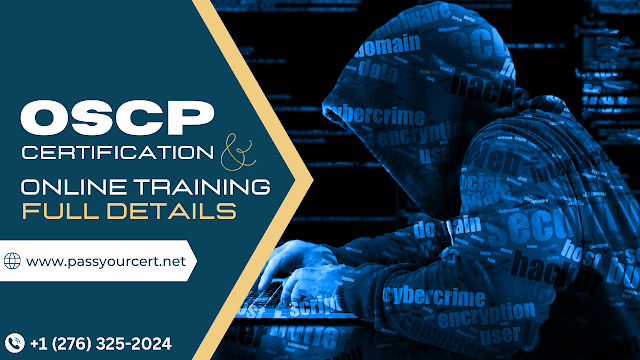OSCP Certification: Mastering the Path to Becoming an Ethical Hacking Professional
The Offensive Security Certified Professional (OSCP) is a highly respected ethical hacking certification provided by Offensive Security. OSCP Certification is designed to validate the practical knowledge and technical skills required to carry out penetration testing exercises. Unlike many theoretical certifications, the OSCP emphasizes hands-on training, making it a benchmark for professionals looking to prove their ability to uncover and mitigate security vulnerabilities.
The OSCP is ideal for professionals aiming to deepen their expertise in penetration testing or those transitioning into the cybersecurity industry. It stands out due to its rigorous 24-hour practical exam, which challenges candidates to exploit vulnerabilities in multiple systems and provide a comprehensive report. The certification covers a wide array of domains, from web and network attacks to privilege escalation and active directory exploitation, ensuring that candidates gain holistic and in-depth experience.
Benefits of the OSCP Certification
1. Career Advancement Opportunities
The OSCP opens up multiple career paths in cybersecurity. Certified professionals can work as:
- Penetration Testers
- Cybersecurity Consultants
- Security Engineers
- Information Security Analysts
- Senior Security Consultants
2. Recognition in the Industry
The OSCP is a gold standard certification in the penetration testing community. It’s globally recognized by employers as a validation of both technical and problem-solving skills. This certification is highly regarded due to its focus on practical, real-world scenarios, making it a valuable credential for professionals aiming for roles that involve vulnerability assessment and exploitation.
3. Hands-On Expertise
Unlike certifications that test theory, the OSCP focuses on practical skills. Certified professionals demonstrate their ability to handle complex penetration testing engagements, making them well-prepared to tackle real-world security challenges.
4. Enhances Problem-Solving Skills
The OSCP’s lab environment is designed to simulate real-world scenarios, requiring candidates to think critically and creatively. Candidates must find, exploit, and document vulnerabilities in diverse systems, which hones their analytical and problem-solving skills.
5. High Earning Potential
OSCP holders are often able to command higher salaries than their non-certified peers. This credential showcases not just a strong understanding of penetration testing methodologies but also practical proficiency, making certified professionals more competitive in the job market.
OSCP Exam Format and Requirements
The OSCP exam is a rigorous, hands-on test that evaluates candidates’ ability to perform real-world penetration testing under time constraints. Below is a detailed breakdown of the OSCP exam format:
Exam Duration:
- 24 Hours of Practical Lab-Based Testing
- 24 Hours to Submit the Final Report
Exam Structure:
- Number of Machines: 5 Target Machines
- Scoring: Points are assigned based on the difficulty of each machine. A minimum of 70 out of 100 points is required to pass.
Required Skills:
- Networking Knowledge: Understanding of TCP/IP protocols
- Operating Systems: Familiarity with Linux and Windows
- Scripting Languages: Experience with Bash, Python, and PowerShell is advantageous
- Penetration Testing Tools: Proficiency in using tools like
Nmap,Metasploit,Netcat, andBurp Suite
Key Exam Focus Areas:
- Information Gathering and Enumeration: Using tools like
NmapandNikto. - Exploitation Techniques: Utilizing
Metasploitand manual exploitation methods. - Privilege Escalation: Discovering and exploiting local vulnerabilities.
- Post-Exploitation and Reporting: Detailed documentation of findings and methods.
Comprehensive OSCP Certification Salary Overview
The salary range for cybersecurity professionals varies significantly based on roles and experience levels. For Penetration Testers, the annual salary ranges from $59,000 to $137,000, with an average of $93,464. Security Engineers earn between $62,000 and $135,000, averaging $104,632. Cyber Security Consultants have a range of $66,000 to $154,000, with an average of $90,973. Information Security Analysts earn $58,000 to $115,000, averaging $80,497, while Cyber Security Analysts make between $52,000 and $111,000, with an average of $74,877. Senior Security Consultants earn between $82,000 and $160,000, with an average salary of $115,862. Information Security Managers earn from $124,000 to $167,000, averaging $150,000, and Security Architects command salaries ranging from $124,000 to $165,000, with an average of $128,587.
OSCP Certification Cost and Training Options
The cost of the OSCP certification depends on the package selected:
- PWK Course with 30 Days Lab Access: $800
- PWK Course with 60 Days Lab Access: $1,000
- PWK Course with 90 Days Lab Access: $1,200
Training Pathways
- PEN-100 (Basic): Introduces penetration testing concepts and serves as a primer for beginners.
- PEN-200 (Intermediate): This course is directly tied to the OSCP exam and provides extensive lab practice.
- PEN-210 (Wireless): Teaches wireless auditing and exploitation techniques.
- PEN-300 (Advanced): Focuses on bypassing security mechanisms.
Recommended Study Resources and Tips
- Books: The Hacker Playbook, Advanced Penetration Testing by Wil Allsopp
- Online Platforms: Hack The Box, TryHackMe
- Community Support: OSCP forums, Discord channels
- Practice Labs: Focus on machines in HackTheBox that closely mimic OSCP scenarios (e.g.,
Blue,Cronos,Querier).
Study Tips
- Create a Study Schedule: Allocate dedicated time each week for practice and revision.
- Start with Easier Machines: Gradually increase the difficulty as you gain confidence.
- Take Notes: Document every step to aid in the final reporting process.
- Use Multiple Tools: Learn to work with both automated tools and manual exploitation techniques.
Conclusion
The OSCP Certification is a distinguished and rigorous credential in the cybersecurity industry. It sets a high standard for penetration testing expertise and opens doors to advanced roles in the field. By mastering the skills required and dedicating ample time to preparation, candidates can pass the OSCP exam and gain recognition as proficient ethical hackers.


%20656-0395%20(3).png)

Comments
Post a Comment